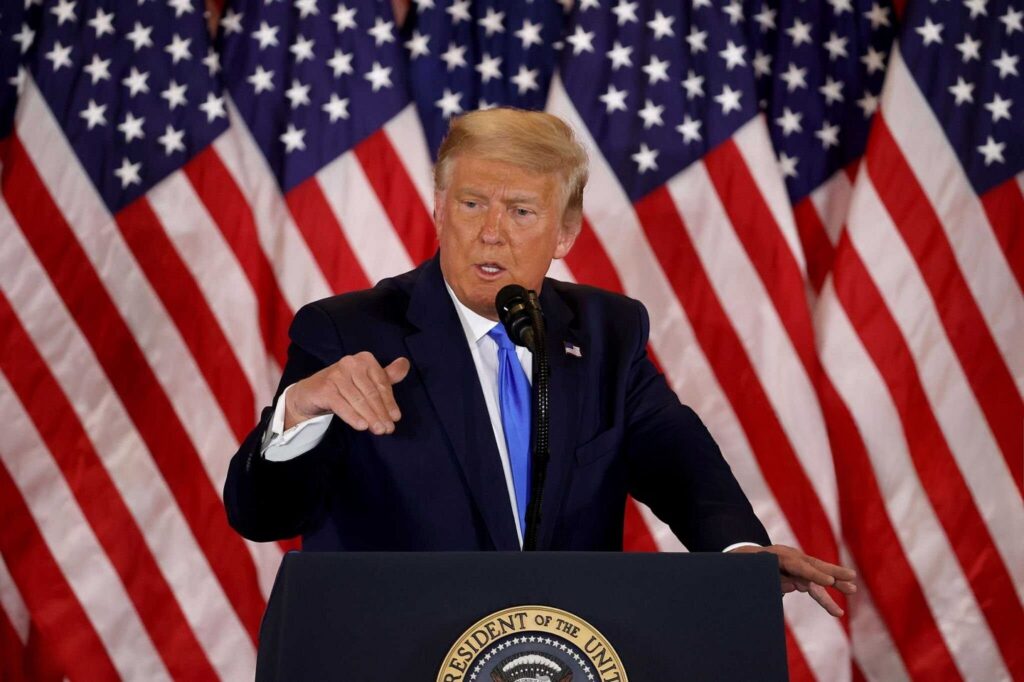Emeritus professor Sylvester Eijffinger: ‘Trump has drastically changed the stakes of the game’
Seven years ago, Univers asked professor Sylvester Eijffinger about the motivations behind President Donald Trump’s flaring trade war in his first term. This time we ask the now emeritus professor the question again, and the answers are similar, but on closer inspection they do not.

President Trump is once again waging a ruthless economic battle against the rest of the world. At the time , it remained a threat, this time it is serious about a global trade war, initiated by President Donald Trump in his second term. What does Trump think Trump will gain from that? Because Trump is not only attacking old enemies such as China, but friendly Europe is also having to pay the price in his fight.
With a profound sense of detail, emeritus professor Sylvester Eijffinger sketches a Trumpian worldview, which he then applies to the prosaic reality of the economic sciences.
Game theory
‘If you try to explain the current situation on the basis of a good economic model, a lot becomes clear,’ Eijffinger thinks. He finds the answer to that question about the why of the trade war in game theory, a mathematical model that is also widely used in economics.
‘The trade wars can best be explained on the basis of a so-called non-cooperative game, a variant of game theory,’ Eijffinger kicks off. In the trade wars, he sees that Trump is forcing a ‘game’ on his opponents. That is the great similarity between the previous and the current situation.
Nash
But in the previous ‘game’ there was still equal power relations. ‘It was a so-called Nash game,’ Eijffinger continues, ‘invented by the mathematician John Nash, who became known to the general public through the appealing Hollywood film A Beautiful Mind, starring Russell Crowe.’
In Nash’s model, all opponents are equal, and all participants act independently of each other, Eijffinger explains, without agreements with each other and without coalitions. But in Trump’s current term, the game is played much more complexly. Because Trump has drastically changed the stakes of the game.
Superiority
In Trump’s first term, there was no clear winner, and all parties eventually compromised, with some economic collateral damage into the bargain. Now the deck is reshuffled fundamentally. Eijffinger: ‘This time there is no question of equality. Trump has raised the stakes by also including European military security in the ‘game’.
‘America is still the dominant player in the military field and when it comes to military intelligence. And with that, Trump gets the upper hand in the game. He leads and Europe can only follow,’ Eijffinger teaches. ‘This is called a Stackelberg game in game theory, although I don’t think Trump is familiar with that name, because the man has hardly had a decent education.’
Much more complex
Because it has become not only a trade war but also a security crisis, the predicted outcome of the game becomes a lot more complex. ‘Who could imagine that President Macron of France would make nuclear weapons available for European defense and that Germans would let go of the so-called Schuldenbremse ?’ asks Eijffinger aloud.
‘Some people think that Trump is suffering from dementia, but that doesn’t matter at all for the outcome,’ Eijffinger thinks. ‘Trump is carrying out Project 2025, the plan of an ultra-conservative think tank, in which he rules by decree to sideline the US Congress. And he doesn’t care about constitutional boundaries, which is now even causing Trump clashes with the chief justices of the country.’
Midterms
But where does this game end and what are the consequences for the United States and for Europe? ‘In America, the pendulum of power usually swings further from ‘left’ to ‘right’ than in Europe,’ Eijffinger analyses. ‘And Trumpism is a reaction to what in my view is unduly wokism, which dominated under Obama and Biden.
‘Trump is in a hurry,’ Eijffinger thinks. ‘Because with the midterm elections in a year and a half, the Republicans are going to lose massively, and then there will be a new balance with the Democratic opponent in Congress. That is how it has always been so far. So, Trump wants to achieve his ultimate goal quickly, and that is to take back dominance in a military, political and economic sense, he makes no secret about that.’
In all areas at the same time
‘America is trying to put pressure on the rest of the world. But because Trump is charging on all fronts at the same time, there are no more separate files,’ Eijffinger concludes. ‘And that makes the outcome of this game incredibly complex.
But in the end, Trump is not going to win,’ Eijffinger ventures to make a prediction. “This trade war will only have losers, and so this time there will be another compromise.”






